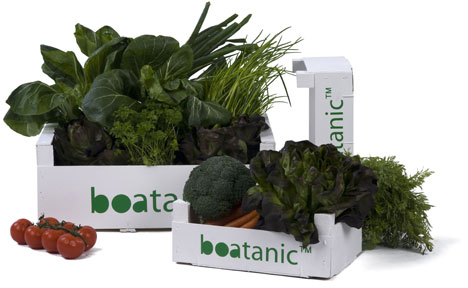Floating Farms on Inner City Waterways
A novel solution to the lack of space for food cultivation in modern cities. Boatanic is a proposal for small sized mobile urban farms:
Boatanic makes use of discarded tourist boats as these are ideally suited for conversion into floating greenhouses due to their glass windows and roof. The idea dawned on us when were walking around Amsterdam and realised that the typical tourist boat resembles a greenhouse. What if you replaced tourists with basil or tomatoes? The Boatanic was born.

Customers can track the Boatanic’s produce and location via its website and iPhone app. The website will refresh daily and show the day’s herbs, fruits and vegetables that are available for purchase. By picking, choosing and placing in the basket you make your order. The iPhone App would provide the location of the Boatanic at all times for direct incidental sales from the boat (a chalkboard menu would advertise the pick of the day).
The aim is to sell this produce to local customers living near the canals, as well as bulk supply to restaurants. I love this idea, because it signifies a return to the original functional purpose of canals which was to facilitate rapid delivery of goods through cities. With the development of the automobile and the expansion of consumerist society in the 20th century, the architectural intent of urban canals has been all but forgotten. We admire them for their beauty and as sites of recreation, but their vital role in urban infrastructure has been downgraded. Boatanic is a fresh attempt to reposition the canals as important links in the local supply chain whilst maintaining a low ecological footprint.
If you are in Amsterdam this summer, you can visit Fort Asperen where the concept is on exhibition until September.